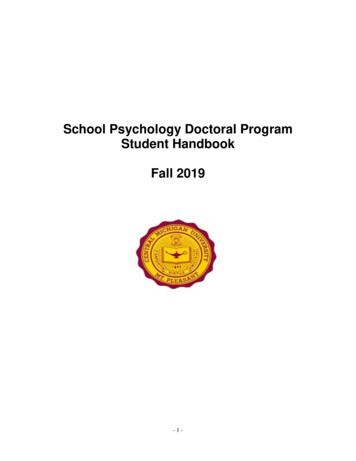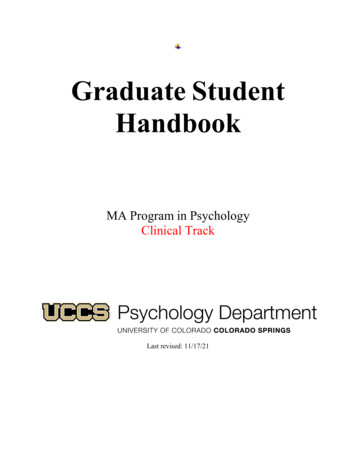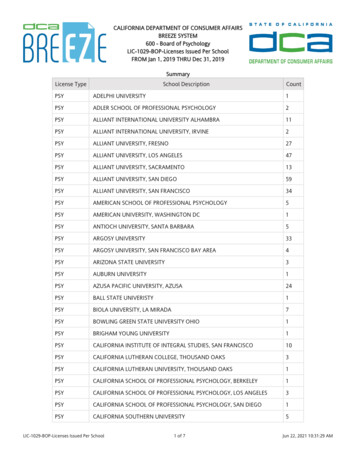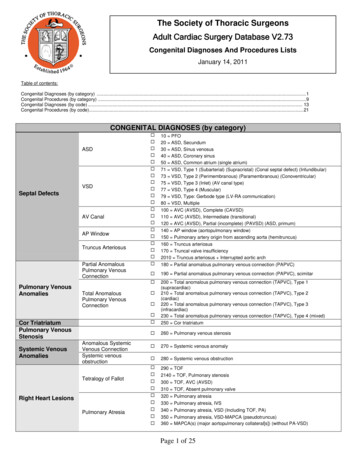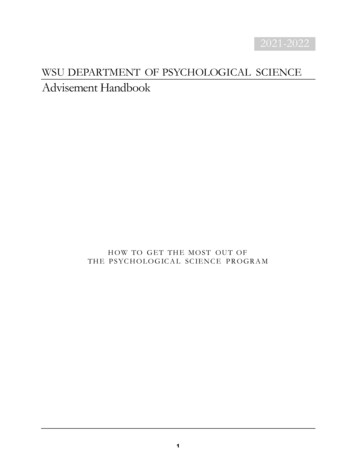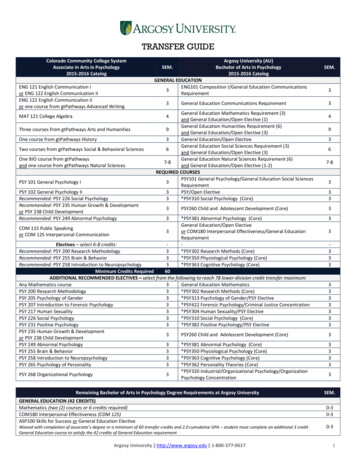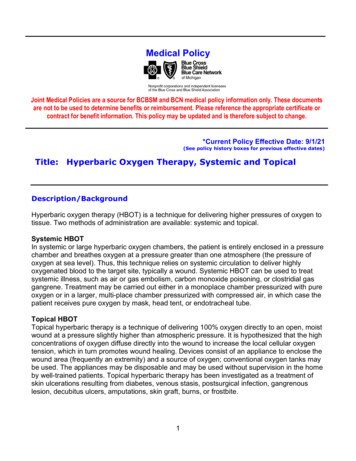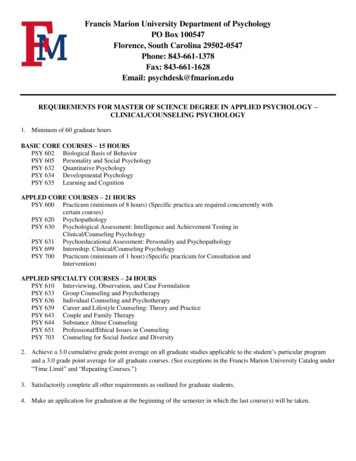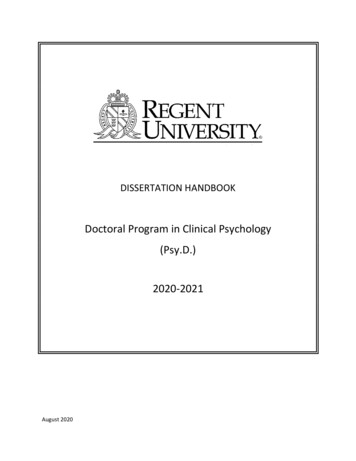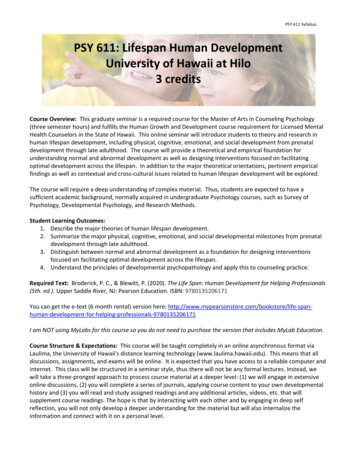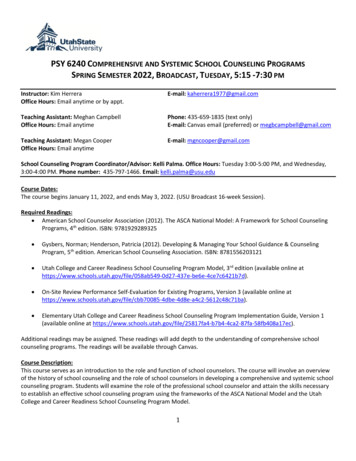
Transcription
PSY 6240 COMPREHENSIVE AND SYSTEMIC SCHOOL COUNSELING PROGRAMSSPRING SEMESTER 2022, BROADCAST, TUESDAY, 5:15 -7:30 PMInstructor: Kim HerreraOffice Hours: Email anytime or by appt.E-mail: kaherrera1977@gmail.comTeaching Assistant: Meghan CampbellOffice Hours: Email anytimePhone: 435-659-1835 (text only)E-mail: Canvas email (preferred) or megbcampbell@gmail.comTeaching Assistant: Megan CooperOffice Hours: Email anytimeE-mail: mgncooper@gmail.comSchool Counseling Program Coordinator/Advisor: Kelli Palma. Office Hours: Tuesday 3:00-5:00 PM, and Wednesday,3:00-4:00 PM. Phone number: 435-797-1466. Email: kelli.palma@usu.eduCourse Dates:The course begins January 11, 2022, and ends May 3, 2022. (USU Broadcast 16-week Session).Required Readings: American School Counselor Association (2012). The ASCA National Model: A Framework for School CounselingPrograms, 4th edition. ISBN: 9781929289325 Gysbers, Norman; Henderson, Patricia (2012). Developing & Managing Your School Guidance & CounselingProgram, 5th edition. American School Counseling Association. ISBN: 8781556203121 Utah College and Career Readiness School Counseling Program Model, 3rd edition (available online 437e-be6e-4ce7c6421b7d). On-Site Review Performance Self-Evaluation for Existing Programs, Version 3 (available online 4d8e-a4c2-5612c48c71ba). Elementary Utah College and Career Readiness School Counseling Program Implementation Guide, Version 1(available online at a2-87fa-58fb408a17ec).Additional readings may be assigned. These readings will add depth to the understanding of comprehensive schoolcounseling programs. The readings will be available through Canvas.Course Description:This course serves as an introduction to the role and function of school counselors. The course will involve an overviewof the history of school counseling and the role of school counselors in developing a comprehensive and systemic schoolcounseling program. Students will examine the role of the professional school counselor and attain the skills necessaryto establish an effective school counseling program using the frameworks of the ASCA National Model and the UtahCollege and Career Readiness School Counseling Program Model.1
Key Course Objectives - Overall:1. Learn to apply course material, to improve thinking, problem solving, and decisions2. Develop skills, competencies, and mindsets needed by professional school counselors3. Develop skill in expressing yourself orally and in writingCourse Objectives – Knowledge & Skill Outcomes:1. History and development of school counseling2. History and philosophy of the counseling profession and its specialty areas3. The role and process of the professional counselor advocating on behalf of the profession4. Professional counseling credentialing, including certification, licensure, and accreditation practices andstandards, and the effects of public policy on these issues5. Strategies for assessing abilities, interests, values, personality and other factors that contribute to careerdevelopment6. Strategies for career development program planning, organization, implementation, administration, andevaluation7. Needs assessments8. Evaluation of counseling interventions and programs9. Analysis and use of data in counseling10. School counselor roles as data driven leaders, advocates, collaboration and systemic change agents in P-12schools11. Community resources and referral sources professional organizations, preparation standards, andcredentials relevant to the practice of school counseling12. Development of school counseling program mission statements and objectives13. Systemic dropout prevention14. Strategies to promote equity in student achievement and college access15. Use of accountability data to inform decision makingCourse Requirements: (More information, including specific requirements, for each discussion, assignment, project, andquiz will be available in Canvas and opened at least one week before the due date.) General Requirements: Students are expected to attend class each week, complete all reading requirements,complete all assignments and discussion posts on time, take all exams and quizzes, and actively participate inweekly class discussions. Class Meetings: The formal class meetings are designed to be an interactive opportunity to further yourunderstanding of the design, implementation, and evaluation processes of a comprehensive and systemic schoolcounseling program. Students are encouraged to ask critical questions, make comments, and engage with oneanother during class meetings. Attendance/Participation: Students are expected to attend class at their broadcast site each week andparticipate in discussions and in-class assignments. You are preparing for a profession in which daily presence isimperative to the success of your students, and your attendance in class begins to represent that commitment.Therefore, attendance will be taken. At the same time, each of us lives in unique contexts that may require anoccasional absence. In particular, you may need to miss class if you are ill or to take care of a family member.Because of this, students can miss up to one day of class and still meet the 90% requirement for fullattendance/participation points. Please inform me in advance via email if you will be missing class so I can planappropriately. If you miss class entirely, you will not receive attendance/participation points. An alternateassignment (2-page paper) will be assigned to ensure that you engage with key concepts. The alternateassignment must be turned in within a week of the missed class to receive points. The option to complete analternate assignment for missing class can only be used once during the semester. If you have extenuatingcircumstances that prevent you from being able to attend in-person instruction, you are welcome to investigate2
options to seek disability resource center (DCR) accommodation support: https://www.usu.edu/drc/ or optionsfrom USU's graduate policies for requesting a leave of absence. Late Work: Late work will only be accepted when there are extenuating circumstances and the student hasmade arrangements with the instructor. If alternate arrangements have not been made with the instructor,students will not receive points for assignments turned in after the due date. Discussion Posts: There will be four discussion posts throughout the course. Students will be required torespond to the question posed by the due date outlined in the course overview. Students must also provide athoughtful response to at least two other student’s posts. Responses are due by Friday at 11:59 PM followingthe discussion post due date. Quizzes: There will be three quizzes, consisting of multiple-choice questions, short answers, and/or essayquestions, given periodically throughout the course. Quizzes are designed to assess required readings, lectures,guest speakers, and course content. Assignments: There will be seven application assignments to demonstrate skill in applying the principles fromassigned readings and lectures. Assignments submitted early may not be graded until after the due date. Forfinal grading, all assignments must be completed and graded. Final Exam: The comprehensive final will be taken via Canvas. The final will open on April 26 at 8:00 AM andclose on May 3 at 11:59 PM. The final exam will cover material from the reading assignments, lectures, classdiscussions, and guest speakers. You may not consult with one another regarding the final exam. Each studentneeds to do the work needed to respond to exam items. The final exam will consist of multiple-choice, shortanswer, and essay questions. Be sure to complete reading assignments and attend class so you are prepared forthe final exam. Final Group Project: Students will complete a final group project to demonstrate understanding of the programcomponents necessary to design, implement, and evaluate a comprehensive and systemic school counselingprogram. Each group will be expected to complete the following tasks:o Create an evidence box in Google drive using the sample evidence documents provided (either usingevidence from an elementary, middle/junior high, or high school). The Google drive link will be madeavailable once the groups have been established. Each standard, including Assurances, should have its own folder that is clearly labeled with thetitle of the standard. Within each folder, subfolders may be used to help define the purpose ofthe supporting documents.o Complete the following five templates as a group using the sample evidence documents and save themin the corresponding Standard folder that they support: Group Template #1: School Data Summary Group Template #2: Data Project - only answer the following 6 sections:1. Area of Focus2. Target Group3. Baseline Data4. Goal Statement5. How does this project support the School Improvement Plan?6. How will achieving this goal lead to significant and meaningful outcomes for students? Group Template #3: College and Career Readiness Student Mindsets and Competencies ActionPlan Group Template #4: Principal/Counselor Agreement (vision and mission statements only) Group Template #5: For secondary, complete a Performance Self-Evaluation based on yourgroup’s school counseling program evidence box by rating each standard (pgs. 9-15) andcompleting the Program at a Glance (pg. 17). For elementary, complete an Elementary SchoolCounseling Program Self-Evaluation (pg. 19-23) and Program at a Glance (pg. 24) found in theElementary Implementation Guide.3
o Each group will create a 10 to 15-minute presentation, including PowerPoint slides, on their assignedStandard (determined by the instructor). Students will present to the class as if they were presentingresults to a school counseling leader (LEA or USBE). Each student of the group is expected to contributeduring the presentation. The PPT should be saved in the group’s evidence box (on its own, outside of theStandard folders).o On the evening that presentations are given, each student will complete a short peer review (resultsand recommendations) for each presentation they observe as well as write a brief self-reflection abouttheir group project experience/contribution. A template for peer reviews will be provided.o Each group member will be required to share Google links for each requirement in Canvas (i.e.,evidence box, templates, and the final presentation slide deck) to complete their Final Group Project.Grading Scheme:Attendance/Participation (5%)Assignments (35%)Discussions (10%)Quizzes (15%)Final Group Project (25%)Final Exam (10%)Total Points Possible90% or higher (1 absence or less)7 at 20 points each4 at 10 points each3 at 20 points each1 at 10 (evidence box)5 at 10 points each (templates)1 at 20 points each (presentation)1 at 20 (results and recommendations)1 at 40 points each 20 points 140 points 40 points 60 points 100 points 40 points 400 pointsGrading Scale:A 100 - 93%B- 82.99% - 80%D 69.99% - 67%A- 92.99% – 90%C 79.99% - 77%D 66.99% - 63%B 89.99% – 87%C 76.99% - 73%D- 62.99% - 60%B 86.99% - 83%C- 72.99% - 70%F 60%PSYCHOLOGY 6240 – COURSE OVERVIEWPlease note that the class schedule is not a binding contract and is subject to revisions, as needed, during thesemester. Students will be notified in advance via Canvas regarding any changes.DateTopicReadings and Assignments DueObjectivesHistory of School CounselingJan. 11Readings:1,2 Gysbers Chapter 1Models and Frameworks of SchoolReadings:Jan. 181,2,12Counseling Programs (K-12): Introduction to Utah Model Preface, Chapter 1the Utah College and Career Readiness School(Introduction), and Appendix ACounseling Program Model (Utah Model) & ASCA Model Preface, Introduction,ASCA National Model (ASCA Model)and Executive Summary Gysbers Chapter 3Jan. 25Quiz #1 & Group Project Sign-ups due by Jan.18, 5 PMReadings: Performance Self-EvaluationOverview (pgs. 2-8)Introduction to the USBE: Program Review,Evidence Box, School Counseling ProgramBoard Rule, and the USBE Website44,8
Review: USBE Board Rule R277-462: SchoolCounseling Program Evidence Box GuideVideo: (come prepared to discuss in class) Gearing Up for the Formal ReviewGuest Speakers: Michelle Glaittli, USBE SchoolCounseling Program SpecialistFeb. 1Assignment #1 due by Jan. 25, 5 PMReadings: Utah Model Chapter 3 ASCA Model Section 1: DefineThe Professional Role of the SchoolCounselor: Utah Model (Who We Are) & ASCAModel (Define)3,4,10,11Review only (do not read in detail): Utah Effective Professional SchoolCounselor Evaluation Standards ASCA Ethical Standards for SchoolCounselors ASCA School Counselor ProfessionalStandards and CompetenciesGuest Speaker: Hillary Emmer, Utah SchoolCounselor Association (USCA) Past PresidentFeb. 8Assignment #2 due by Feb. 1, 5 PMReadings: Utah Model Chapter 2 ASCA Model Section 2: Manage (pgs.29-45 & 52-54) Gysbers Chapter 4Data-Informed School Counseling: UtahModel (Data Driven Leadership) & ASCAModel (Manage)7,9,14,15Review: Performance Self-EvaluationStandards 1 & 2Guest Speaker: Momi Tu’ua, AssistantPrincipal, Timpview High School (formerschool counselor and USBE School CounselingProgram Specialist)Feb. 15Assignment #3 due by Feb. 8, 5 PMReadings: Utah Model Chapter 4, MTDSS (pgs.50-51), Appendix B, and Appendix C ASCA Model Section 3: DeliverDirect and Indirect Student Services – TheFour Program Components of the DeliverySystem: Utah Model (What We Do) & ASCAModel (Deliver)Review: Utah Board Rule R277-464: School513,14
Feb. 22Counselor Direct and Indirect ServicesASCA Position Statement: The SchoolCounselor and Multitiered System ofSupportsQuiz #2 & Discussion #1 due by Feb. 15, 5 PMReview: Performance Self-EvaluationStandards 3 & 4 Utah State Code 53E-2-304: PCCRDefinition Utah Board Rule R277-462-5: PCCRPlan for College and Career Readiness &Career Literacy (Utah Model); ASCA Model(Appraisal & Advisement)5,6,14Video: (come prepared to discuss in class) Student Plan for College and CareerReadiness (PCCR) MeetingGuest Speaker: Ashley Higgs, USBE CTE Collegeand Career Awareness SpecialistMar. 1Mar. 8Mar. 15Assignment #4 due by Feb. 22, 5 PMAllocated time to work on group projectNo Class – Group Project CollaborationDiscussion #2 due by Mar. 1, 5 PMUSCA Conference 3/10 & 3/11Readings: ASCA Model Section 2: Manage (pgs.46-51 & 55-57)Review: Performance Self-Evaluation Standard5No Class – Spring BreakCollaborative Classroom Instruction (UtahModel); ASCA Model (Instruction)5,6,14Guest Speaker: Kalee Crandall, EdutechServices, Inc. (ctesurveys.com)Mar. 22Assignment #5 due by Mar. 15, by 5 PMReview: Performance Self-Evaluation Standard6Systemic Approach to Dropout Preventionwith Social-Emotional Supports (Utah Model);ASCA Model (Counseling, Crisis Response, andReferrals)13Guest Speaker: Mitzi Quarez, SchoolCounselor, Stansbury High SchoolMar. 29Assignment #6 and Discussion #3 due by Mar.22, 5 PMReadings: Utah Model Chapter 5 ASCA Model Section 2: Manage (pgs.58-76)Systemic Program Management: Utah Model(How We Do It) & ASCA (Manage)612
Review: Performance Self-Evaluation Standard7 & AssurancesGuest Speaker: Jon Butler, School CounselingCoordinator, Washington County SchoolDistrictApr. 5Quiz #3 due by Mar. 29, 5 PMReadings: Elementary Utah College and CareerReadiness School Counseling ProgramImplementation GuideElementary School Counseling ProgramsGuest Speakers: Elise Hansen & Jeana James,Elementary School Counselors, North Sanpete& Washington County School DistrictsApr. 12Discussion #4 due by Apr. 5, 5 PMReadings: Utah Model Chapter 6 ASCA Model Section 4: Assess Gysbers Chapter 10Program Evaluation & ProfessionalAccountability: Utah Model (Why It Matters)& ASCA (Assess)8,9,10Guest Speaker: Joni Shook, ASCA-CertifiedTrainerApr. 19Group PresentationsApr. 26Group PresentationsMay 3Finals WeekAssignment #7 and Group Evidence Box,Templates, and PowerPoint Slide Deck due byApr. 12, 5 PMFinal Group Presentation (in class)Final Group Presentation (in class)Peer Review Results & Recommendationsdue Apr. 29, by 11:59 PMFinal Exam due May 3, 11:59 PMUniversity Policies & ProceduresAcademic Freedom and Professional ResponsibilitiesAcademic freedom is the right to teach, study, discuss, investigate, discover, create, and publish freely.Academic freedom protects the rights of faculty members in teaching and of students in learning. Freedom inresearch is fundamental to the advancement of truth. Faculty members are entitled to full freedom in teaching,research, and creative activities, subject to the limitations imposed by professional responsibility. Faculty CodePolicy #403 further defines academic freedom and professional responsibilities.Academic Integrity – "The Honor System"Each student has the right and duty to pursue his or her academic experience free of dishonesty. To enhance thelearning environment at Utah State University and to develop student academic integrity, each student agrees tothe following Honor Pledge:7
"I pledge, on my honor, to conduct myself with the foremost level of academic integrity."A student who lives by the Honor Pledge is a student who does more than not cheat, falsify, or plagiarize. Astudent who lives by the Honor Pledge: Espouses academic integrity as an underlying and essential principle of the Utah State Universitycommunity;Understands that each act of academic dishonesty devalues every degree that is awarded by thisinstitution; andIs a welcomed and valued member of Utah State University.Academic DishonestyThe instructor of this course will take appropriate actions in response to Academic Dishonesty, as defined theUniversity’s Student Code. Acts of academic dishonesty include but are not limited to: Cheating: using, attempting to use, or providing others with any unauthorized assistance in taking quizzes,tests, examinations, or in any other academic exercise or activity. Unauthorized assistance includes:o Working in a group when the instructor has designated that the quiz, test, examination, or any otheracademic exercise or activity be done “individually;”o Depending on the aid of sources beyond those authorized by the instructor in writing papers, preparingreports, solving problems, or carrying out other assignments;o Substituting for another student, or permitting another student to substitute for oneself, in taking anexamination or preparing academic work;o Acquiring tests or other academic material belonging to a faculty member, staff member, or anotherstudent without express permission;o Continuing to write after time has been called on a quiz, test, examination, or any other academicexercise or activity;o Submitting substantially the same work for credit in more than one class, except with prior approvalof the instructor; or engaging in any form of research fraud.Falsification: altering or fabricating any information or citation in an academic exercise or activity.Plagiarism: representing, by paraphrase or direct quotation, the published or unpublished work of anotherperson as one‘s own in any academic exercise or activity without full and clear acknowledgment. It alsoincludes using materials prepared by another person or by an agency engaged in the sale of term papers orother academic materials.For additional information go to: ARTICLE VI. University Regulations Regarding Academic Integrity.Sexual Harassment/Title IXUtah State University is committed to creating and maintaining an environment free from acts of sexual misconduct anddiscrimination and to fostering respect and dignity for all members of the USU community. Title IX and USU Policy 339(https://www.usu.edu/policies/339/) address sexual harassment in the workplace and academic setting.The university responds promptly upon learning of any form of possible discrimination or sexual misconduct. Anyindividual may contact USU’s Affirmative Action/Equal Opportunity (AA/EO) Office for available options andresources or clarification, leading to an informal resolution of the matter. Further information and forms forreporting an incident to USU can be found at: http://aaeo.usu.eduWithdrawal Policy and "I" Grade PolicyStudents are required to complete all courses for which they are registered by the end of the semester. In somecases, a student may be unable to complete all of the coursework because of extenuating circumstances, but notdue to poor performance or to retain financial aid. The term ‘extenuating’ circumstances includes: (1) incapacitatingillness which prevents a student from attending classes for a minimum period of two weeks, (2) a death in theimmediate family, (3) financial responsibilities requiring a student to alter a work schedule to secure employment,8
(4) change in work schedule as required by an employer, or (5) other emergencies deemed appropriate by theinstructor.Students with DisabilitiesUSU welcomes students with disabilities. If you have, or suspect you may have, a physical, mental health, or learningdisability that may require accommodations in this course, please contact the Disability Resource Center (DRC) as earlyin the semester as possible (University Inn # 101, (435) 797-2444, drc@usu.edu). All disability related accommodationsmust be approved by the DRC. Once approved, the DRC will coordinate with faculty to provide accommodations.Diversity StatementRegardless of intent, careless or ill-informed remarks can be offensive and hurtful to others and detract from thelearning climate. If you feel uncomfortable in a classroom due to offensive language or actions by an instructor orstudent(s) regarding ethnicity, gender, or sexual orientation, contact: Division of Student Affairs: https://www.usu.edu/student-affairs/, (435) 797-1712, studentservices@usu.edu,TSC 220Student Legal Services: advocacy/legal-services, (435)797-2912, TSC 326Access and Diversity: http://accesscenter.usu.edu, (435) 797-1728, access@usu.edu; TSC 315Multicultural Programs: http://accesscenter.usu.edu/multiculture, (435) 797-1728, TSC 315LGBTQA Programs: http://accesscenter.usu.edu/lgbtqa, (435) 797-1728, TSC 3145Provost‘s Office Diversity Resources: https://www.usu.edu/provost/diversity, (435) 797-8176You can learn about your student rights by visiting The Code of Policies and Procedures for Students at Utah StateUniversity: e ProcessStudents who feel they have been unfairly treated may file a grievance through the channels and procedures describedin the Student Code: Article VII.Full details for USU Academic Policies and Procedures can be found at: Student ConductStudent CodeAcademic IntegrityUSU Academic Policies and ProceduresAcademic Freedom and Professional Responsibility PolicyEmergency ProceduresIn the case of a drill or real emergency, classes will be notified to evacuate the building by the sound of thefire/emergency alarm system or by a building representative. In the event of a disaster that may interfere witheither notification, evacuate as the situation dictates (i.e., in an earthquake when shaking ceases or immediatelywhen a fire is discovered). Turn off computers and take any personal items with you. Elevators should not beused; instead, use the closest stairs.9
The ASCA National Model: A Framework for School Counseling Programs, 4th edition. ISBN: 9781929289325 Gysbers, Norman; Henderson, Patricia (2012). Developing & Managing Your School Guidance & Counseling Program, 5th edition. American School Counseling Association. ISBN: 8781556203121 Utah College and Career Readiness School Counseling .
